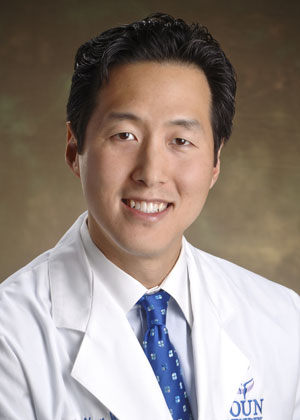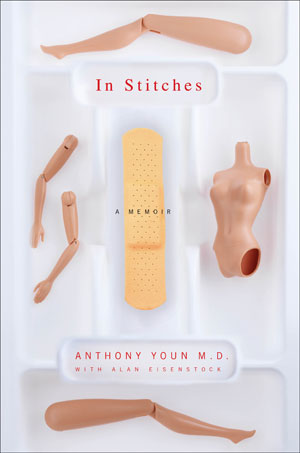Anthony Youn is a walking contradiction.
As a highly telegenic plastic surgeon he appears regularly on Rachael Ray and a long list of other TV shows but chooses to live in a suburb of Detroit. He’s an intelligent, good-looking man with an obvious knack for self-promotion but managed to get through college without a single date. And he specializes in making people look better but is about to publish an autobiography called In Stitches that makes himself out to be a major nerd, at least through most of med school.
Anthony Youn grew up in a small town in the middle of Michigan where his father was an OBGYN. He graduated valedictorian of Greenville High School. He went on to Kalamazoo College in a small city in rural southwestern Michigan and graduated with high honors. Youn earned his M.D. from the Michigan State University College of Human Medicine and completed his training in general and plastic surgery at the Grand Rapids MERC Plastic Surgery Residency Program. He moved to Los Angeles for an aesthetic surgery fellowship with a prominent Beverly Hills surgeon before deciding to return home to Michigan to practice.
In addition to regular appearances on the Rachael Ray Show, Youn been featured on E! Television’s Dr. 90210, CNN, The CBS Early Show, VH1, The Montel Williams Show, America’s Newsroom on the Fox News Channel, the O’Reilly Factor, the E! Special Celebrity Plastic Surgery, Happening Now on the Fox News Channel, HBO’s Youth Knows No Pain, Fox 2 Detroit, NBC Channel 4 Detroit, ABC Channel 7 Detroit, Proper Television’s TV Made Me Do It, among other shows. His comments on celebrity plastic surgery have appeared in a long list of gossip magazines and newspapers. His first book — an autobiographical look at the first quarter century of his life growing up Asian in middle America — is set for publication in April.
Goldsea: Tell us a bit about your parents and childhood.
Anthony Youn: My parents were both born and raised in South Korea. They immigrated to the United States so my dad could undergo medical residency training. Although they expected to return to Korea, they remained in the U.S. He established a solo Ob Gyn practice in a small town in the middle of Michigan. We were some of the only non-Caucasion people in the entire town of 8000.
GS: Give us a picture of yourself as a teen.
AY: I’m working on that!
GS: You are an intelligent, good-looking man. How was it possible for you to finish college without a single date?
AY: I still can’t figure it out. Maybe a lack of self-esteem? Maybe the fact that I was always surrounded by Caucasians who seemed to pretty much date each other and not me? It’s still something I can’t explain, except that I just wasn’t a ‘catch’ for the women back then.
GS: What impact did growing up Asian have on your life?
AY: It was huge. Although I had a lot of friends, and they never made me feel different, I couldn’t help but feel just a little like an outsider. I believe people are more open to different cultures and skin colors now then they were thirty years ago, especially in a small town in mid-Michigan. That being said, I very rarely experienced real racism. It was probably more myself creating these thoughts of being different, rather than others making me feel this way.
GS: What made you decide to become a cosmetic surgeon?
AY: That is a very interesting story that is highlighted in my book In Stitches, available for pre-sale on Amazon.com and BarnesandNoble.com!
GS: What surgical procedure do you perform most often?
AY: Breast augmentation is the most common procedure I perform, with over 150 each year. Next



